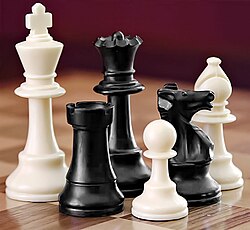Chess
From Wikipedia, the free encyclopedia
This article is about the Western board game. For other chess games or other uses, see Chess (disambiguation).
 | |
| Years active | c. 6th-century India to present |
|---|---|
| Genre(s) | Mind sport Board game Abstract strategy game |
| Players | 2 |
| Setup time | ~1 minute |
| Playing time | Casual games usually last 10 to 60 minutes; tournament games last anywhere from about ten minutes (blitz chess) to six hours or more. |
| Random chance | None |
| Skill(s) required | Strategy, tactics |
Chess is a two-player strategy board game played on a chessboard, a checkered gameboard with 64 squares arranged in an eight-by-eight grid.[1] Chess is played by millions of people worldwide, both amateurs and professionals.
Each player begins the game with 16 pieces: one king, one queen, two rooks, two knights, two bishops, and eight pawns. Each of the six piece types moves differently. The most powerful piece is the queen and the least powerful piece is the pawn. The objective is to 'checkmate'[2] the opponent's king by placing it under an inescapable threat of capture. To this end, a player's pieces are used to attack and capture the opponent's pieces, while supporting their own. In addition to checkmate, the game can be won by voluntary resignation by the opponent, which typically occurs when too much material is lost, or if checkmate appears unavoidable. A game may also result in a draw in several ways.
Chess is believed to have originated in India, some time before the 7th century, being derived from the Indian game of chaturanga. Chaturanga is also the likely ancestor of the Eastern strategy games xiangqi, janggi and shogi. The pieces took on their current powers in Spain in the late 15th century; the rules were finally standardized in the 19th century. The first generally recognized World Chess Champion, Wilhelm Steinitz, claimed his title in 1886. Since 1948, the World Championship has been controlled by FIDE, the game's international governing body; the current World Champion is the Norwegian Magnus Carlsen. FIDE also organizes theWomen's World Championship, the World Junior Championship, the World Senior Championship, the Blitz and Rapid World Championships and the Chess Olympiad, a popular competition among teams from different nations. There is also aCorrespondence Chess World Championship and a World Computer Chess Championship. Online chess has opened amateur and professional competition to a wide and varied group of players. There are also many chess variants, with different rules, different pieces, and different boards.
FIDE awards titles to skilled players, the highest of which is grandmaster. Many national chess organizations also have a title system. However, these are not recognised by FIDE. The term "master" may refer to a formal title or may be used more loosely for any skilled player.
Until recently, chess was a recognized sport of the International Olympic Committee;[3] some national sporting bodies such as the Spanish Consejo Superior de Deportes also recognize chess as a sport.[4] Chess was included in the 2006 and 2010 Asian Games.
Since the second half of the 20th century, computers have been programmed to play chess with increasing success, to the point where the strongest home computers play chess at a higher level than the best human players. Since the 1990s, computer analysis has contributed significantly to chess theory, particularly in the endgame. The computer IBM Deep Blue was the first machine to overcome a reigning World Chess Champion in a match when it defeated Garry Kasparov in 1997. The rise of strong computer programs (known as "engines") that can be run on hand-held devices has led to increasing concerns about cheating during tournaments.
No comments:
Post a Comment